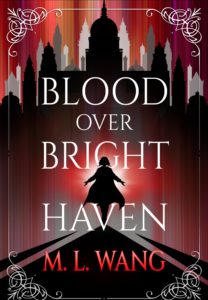
At some point in the year or two between my return to genre reading and my decision to start blogging, The Sword of Kaigen by M.L. Wang became an r/Fantasy darling. It won the Self-Published Fantasy Blog-Off (SPFBO, the elder sister to SPSFC), matching the highest score in the history of the competition, and there was a time when–in my small corners of the Internet–it seemed you couldn’t read a review of R.F. Kuang’s acclaimed The Poppy War without seeing it compared unfavorably to The Sword of Kaigen.
Personally, I felt that The Sword of Kaigen was pretty clumsy at times, with some frustrating infodumps at the beginning and a clumsy sequel hook at the end. But what came between was one of the best things I’d read in a long time, so there was no way I was going to miss Wang’s next novel: Blood Over Bright Haven.
Evidently fate has conspired to keep the Wang/Kuang comparisons coming, because just a year after Kuang’s anti-colonial dark academia Babel, Wang has released one of her own. Blood Over Bright Haven features a bastard daughter from the wrong side of town seeking to become the first woman to break through the cultural and religious barriers that keep the heights of research magistry inaccessible to all but men of good breeding. Recruiting a barbarian janitor to her cause, she seeks to prove that a woman can achieve as much as or more than the best of the men. But her quest for knowledge and achievement uncovers the sort of secrets that calls into question not her city’s sexism, but its entire power structure.
To those who haven’t read Babel, I apologize for spending some time with this comparison. It won’t include spoilers, and I hope context will make my thoughts on Blood Over Bright Haven clear enough. But given the similarities to such a popular recent work, I think an explicit consideration of the contrasts may be helpful for potential readers. Like Babel, Blood Over Bright Haven is a fantasy novel that screams its theme from the rooftops, delving into the horrors perpetrated by the academy in order to keep an empire running. But while the themes and premises may overlap, Blood Over Bright Haven is written for an entirely different audience and reads very, very differently.
Where Babel is set at Oxford and has the pacing of a school novel, Blood Over Bright Haven is set in an institute for magical research in a purely fictional setting. So while there’s certainly some academic influences, the vibe is more magical think tank than magic school. There is no cohort of new students making friends and struggling through classes together, and there’s no character study of a lead dwelling on the uncomfortable experience in an institution that loves their mind but not them as a person. Instead, the lead already knows the institution is against her, but her ambition drives her deep into highly competitive research proposals that may win her fame in spite of the sexism around her. This structure allows for a deep dive into magic systems that would please a Brandon Sanderson fan, but with an immediacy to the exploration that comes from the high-stakes competition.
While the lead’s eyes are wide open about her society’s sexism, she is very much in the dark about their (and her) racism, leading to a situation where the reader can predict certain developments before the character does. There were moments where I found that distracting—especially with a couple side characters written in such a way that there could be zero risk of misunderstanding exactly what kind of society this is—but the white-knuckled tension of the lead’s quest for truth kept me devouring the story even while I wished for a little more subtlety. And being able to predict some mid-book plot developments did not mean I could predict the ultimate ending, which provided plenty of uncertainty to keep me invested.
And that ultimate ending was a true strength of the book. While the pacing was too quick to call it meditative, it still managed to explore a fairly complicated set of implications to both actions and potential actions. The secondary world setting meant that it wasn’t beholden to mapping one-to-one on any real-world conflict or philosophy, allowing it to explore its own world thoroughly but without feeling contrived. The result is a finish that’s thrilling and emotionally intense without being rushed or leaving the reader second-guessing.
Blood Over Bright Haven is a book I could’ve nitpicked for 500 pages. It wears its message on its sleeve, and its characters are written to further that theme, with some of the side characters being particularly unsubtle. And yet, I absolutely couldn’t put it down. The main character’s search for truth was utterly compelling, even when I was pretty sure what that truth would be. And after the curtain was pulled back, the plot was thrilling and unpredictable, with so many different aspects of the world examined, but never so much that the plot began to bog down. If an overt message is going to bother you, Blood Over Bright Haven isn’t the book for you. But if you like exploring magic, uncovering secrets, and striking against the very heart of magical power, it’s a really fantastic read, and one of my favorites of the year.
Recommended if you like: magic systems, secrets, strong anti-racist/anti-sexist themes. The themes of R.F. Kuang with the magic of Brandon Sanderson and pacing that’s probably more consistent than either one.
Can I use it for Bingo? It’s Self-Published by a POC Author and Released in 2023.
Overall rating: 18 of Tar Vol’s 20. Five stars on Goodreads.
